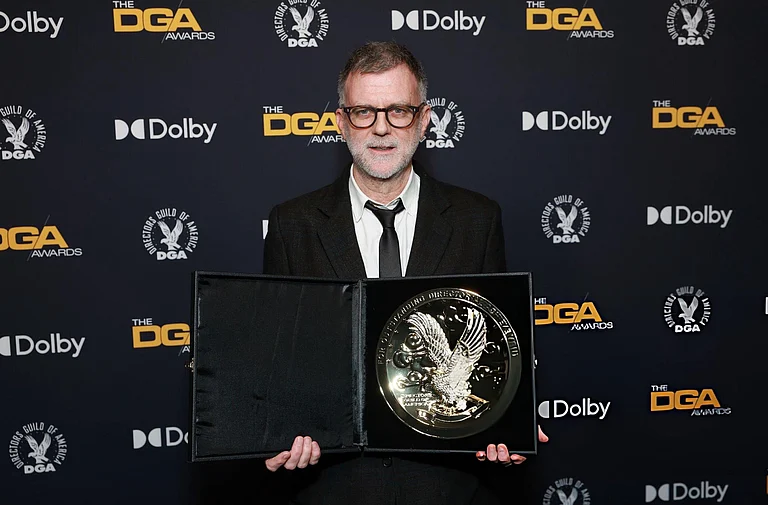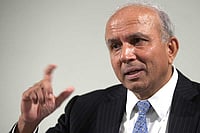The world premiere of Vasan Bala’s Mard Ko Dard Nahin Hota was pretty painless for the filmmaker. The first Indian film ever to be selected as part of the Toronto International Film Festival’s popular Midnight Madness programme, it also gathered the coveted People’s Choice Award in that segment, as the festival concluded. Premieres for films slotted in this section occur at a minute to midnight and the audience, plenty pleased with the screening, streamed out of the Ryerson University auditorium way past 2 am. It was closer to three as the director stopped by the sidewalk outside the venue and chatted merrily with stragglers who had spent two-and-a-quarter hours at the packed show. Also present were the film’s 20-something stars, Abhimanyu Dassani (son of actress Bhagyashree) and Radhika Madan, who gamely struck poses with newfound fans. It may have been the lateness of the hour, but Madan, wearing a tux, wasn’t quite sure whether MKDNH would count as her big screen bow. After all, another film of hers, Pataakha, had its theatrical release in India this Friday, prior to that of MKDNH. That confusion, though, was dispelled as Bala pointed out she had just walked out of the premiere of his film, and so, formally, she was already the debutante she appeared all dressed up for.
Curiously enough, this was a year for newcomers in films with an Indian connection. Assamese director Rima Das, who had won accolades and awards for her previous film Village Rockstars—now also India’s nominee in the Foreign Language Film category for the Oscars—returned to TIFF this year with Bulbul Can Sing. As with the earlier film, she once again used a raw cast, all of them from her native village. Among them is Arnali Das, playing the adolescent Bulbul. Slightly older, though not by much, is Mumbai model Aarshi Banerjee, who essayed the eponymous role in French director Mia Hansen-Love’s Maya, a film largely set in India, particularly Goa. Love was looking for some freshness for her critical character, and it’s around that time that she discovered Banerjee. Another young face to debut at TIFF was Tenzin Dolker in The Sweet Requiem, set amidst the exiled Tibetan community in Delhi. Dolker, who spent much of her life in India before moving to New Orleans, Louisiana, made for yet another exceptional entrance into the film world.
TIFF is known for its long, snaking lines that can often wind around blocks for public screenings. Over its first four days, as has been the norm in recent years, a section of King Street, a major avenue in the city, is blocked off and features a bunch of popup stalls as this part of downtown Toronto acquires the atmosphere of a mela. Among the longest queues witnessed this year was probably at the outlet for Japanese casual wear company Uniqlo, which has recently entered the Canadian market. Hundreds lined up to get to that booth and those numbers may have made some filmmakers with their productions at TIFF a trifle envious. The reason for Uniqlo’s pull? It was giving away thermal garments. With the deep freeze of a Toronto winter not too distant, that attraction was understandable.
TIFF featured over 30,000 minutes of film in 2018 and that included the 807 minutes that La Flor or The Flower, from Argentine director Mariano Llinás, spanned. At the other extreme in what TIFF described as a “work of maximalist minimalism” was 43 seconds of The Invisible Cinema 3. Indian films also had their running times vary widely: Veteran documentary filmmaker Anand Patwardhan brought Reason, which clocked in at over four-and-a-half hours. But, short can be sweet as London-based Sandhya Suri’s 19-minute fiction feature, The Field, proved by snagging an award.
There have been plenty of filmi robots. But director Maxim Pozdorovkin’s documentary The Truth About Killer Robots introduced a fresh voice into the debate about being paranoid about androids. Literally, as the narrator of the film is a robot. There’s much upside about using such a device: You can do retakes without paying for extras, for instance. But there are some unexpected outtakes as well. A robot is described as one that can undertake tasks with humanlike skills. The filmmakers discovered that the robot could not pronounce the word skill. But they found a workaround: The robot could recite “human likes kill.” Which could leave many wondering if such artificial intelligence has Freudian slips...
Agent provocateur Michael Moore’s latest project in polemics, Fahrenheit 11/9, premiered too. The director’s entourage included #TimesUp activist David Hogg. At a post-screening discussion, Hogg was his usual anti-Donald Trump evangelist self. He exhorted the collected crowd to go out and vote in the November midterms, and if not that, donate to candidates. It took a woman in the audience to shout out the obvious to the geographically-challenged Hogg: Toronto may be an hour’s flying time from New York, but it happens to be in another country, Canada.
(The writer is a journalist)
























